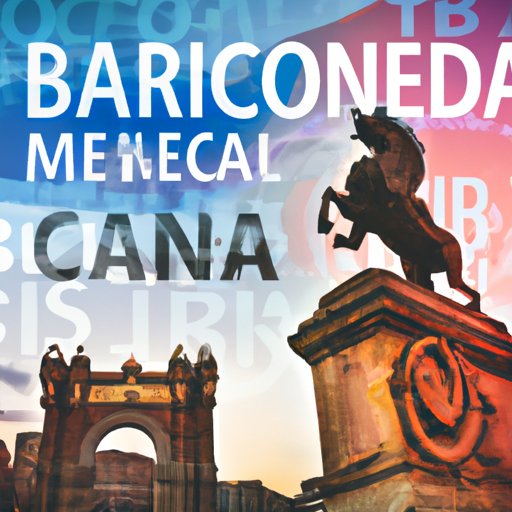
Where is Barcelona Getting Money From?
Barcelona is well-known for its beautiful architecture, impressive football team, and vibrant culture. However, behind the city’s many charms lies a thriving economy that is driving its development. In this article, we will explore where Barcelona is getting its money from and why it is important to understand the inner workings of the city’s economy.
Tracking the Economic Growth of Barcelona
In order to understand where Barcelona is at economically today, we must first look at its past. Historically, Barcelona started as a port city and became a powerhouse in textiles during the industrial revolution. In the 1990s, the city shifted its focus to services and innovation. Today, Barcelona’s economy is diverse and includes several sectors such as tourism, technology, finance, and renewable energy, among others.
Tourism is Barcelona’s main industry. In 2018, the city welcomed over 16 million visitors, contributing roughly 12 billion euros to the city’s economy. The nightlife, culture, and welcoming people attract tourists to the city from all over the world. The city also attracts business and finance professionals with the growing finance and technology sectors.
However, Barcelona has faced significant challenges to its economic growth. The global financial crisis of 2008-2009, political instability caused by the Catalan independence movement, and the COVID-19 pandemic have all impacted the city’s economy. Despite these challenges, the city has remained resilient and continues to grow.
The Influx of Tourism in Barcelona
Tourism is one of the most significant contributors to Barcelona’s economy. With its beautiful architecture, sunny beaches, and rich culture, the city attracts visitors from all over the world. However, the influx of tourists has not been without negative impacts on the local economy and society.
On the positive side, tourism has created jobs and helped to revitalize Barcelona’s many neighborhoods. It has also brought exposure to the city as a destination for investment and business opportunities. However, the surge in tourism has raised concerns about overcrowding, environmental degradation, and rising housing costs.
Barcelona has taken a series of measures to manage the impact of tourism on the local economy. The city has set a limit on the number of tourist accommodations and introduced measures to improve the quality of life for local residents. Additionally, the city has raised taxes on tourism-related activities to fund social programs in the city.
The Role of Foreign Investment in Barcelona
Foreign investment has played a significant role in Barcelona’s economic growth. In recent years, Barcelona has become increasingly attractive to foreign investors due to its business-friendly environment, high-quality infrastructure, and well-educated workforce. Spanish startups are on the rise, due in part to the city’s wide range of accelerators, incubators, and venture capitalists.
Barcelona has attracted a diverse range of investors, including venture capitalists, private equity firms, and corporations. Many of these investors are drawn to the city’s growing tech industry, finance sector, and its thriving real estate market. The city has also seen a rise in sustainable investments in areas like renewable energy and mobility, aligning with its interest in delivering sustainable development within the city.
Public Funding in Barcelona
Public funding plays a crucial role in the ongoing development of Barcelona’s economy. The city uses public funds to invest in research and development, education, infrastructure, and social programs. The public funding is sourced primarily from the Catalonia region and distributed to industries to promote growth and attract investors or talent.
The largest sector to benefit from public funding is the technology and innovation domain; this sector accounts for a significant portion of the city’s public investment. Examples of this include the establishment of innovation labs, the creation of hub spaces and the seeding of Startup incubators. Studies have shown that public funding positively contributes to the growth and expansion of Barcelona’s economy, creating jobs and new industries to support Barcelona’s development.
The Impact of Barcelona’s Tech Industry
Barcelona has emerged as a significant hub for technology companies. Many factors have contributed to the growth of the technology sector in Barcelona, including the presence of high-quality research institutions, a talented workforce, business incubators, and of course, the city’s dynamic culture.
The city has a strong focus on developing its technology sector and has made significant investments in infrastructure, research, and development. The city houses a significant number of startups and larger tech companies eager to make their mark on the industry. The city is gaining a reputation for its tech ecosystem and is attracting interest from investors from all over the world.
Conclusion
Barcelona’s economy is diverse, with a range of industries contributing to its growth. The city’s tourism industry, foreign investment, public funding, and growing tech industry have all played a significant role in driving the city’s economy forward. However, there are still challenges that the city must address, including managing the impact of tourism, addressing inequality, and retaining its place as a hub for innovation.
For those looking to invest in Barcelona, there is a wealth of opportunities in its tourism, technology, finance, renewable energy, a significantly diverse range of other sectors. With supportive infrastructure, established innovation labs, and a talented workforce, Barcelona is the ideal place to start a business or establish your brand. As Barcelona continues its economic growth, it presents an excellent opportunity for investors to be part of this exciting development.





